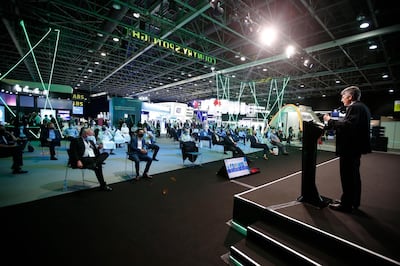At first glance, Marshal Webb might seem an unlikely public servant. Ten years ago, the American computer whizz was part of Lulz Security, a famous network of hackers. The group claimed responsibility for a number of attacks on private and public sector bodies, including a breach in 2011 of tech giant Sony, which stole the details of 100 million PlayStation users.
A decade on, Mr Webb is hitting government targets – the US Air Force, the Pentagon and, most recently, Dubai Police. His motivations, however, have changed for the better. Mr Webb now runs the US-based Path Network, a cybersecurity consultancy that specialises in finding flaws in an organisation's computer systems. He is now on the side of his former victims.
Mr Webb's hack on Dubai Police took place live on stage at this month's Gulf Information Security Expo and Conference (Gisec). The theme of this year's meeting was "Enabling Resilience in Digital Economies", a topic that could hardly be more relevant as a number of Mena countries continue to reap the rewards of digitisation in government services and the private sector. In some Gulf countries, citizens and residents are now able to access government services, apply for visas, access health records and pay fines not from official buildings, but from their smartphones.
Dubai Police registered 25,000 e-crimes last year
Government digitisation strategies have been around for years, but international leaders in the field enjoyed unexpected benefits during the pandemic, when access to physical spaces was limited. The logistical flexibility of modern, cyber-integrated healthcare systems has been a factor behind the world-leading vaccination campaigns of countries such as Israel, the UAE and the UK.
But new solutions bring new risks. The cost of security breaches can be staggering. The research group Cybersecurity Ventures predicts that crimes committed in cyberspace could cost the world about $6 trillion in 2021, a figure it suggests could grow by 15 per cent annually. And as digital currencies increasingly become a feature of modern life, criminals now have a dangerously anonymous means of extorting money.
Attacks can also endanger lives. In February, hackers gained access to the systems of a water treatment plant in Florida, temporarily altering the chemical content of water in the area.
And the personal costs of sensitive information being breached is a threat to all of us, not just governments and companies. Closer to home, Dubai Police registered 25,000 e-crimes last year, up by 11,000 compared to 2019.
Nonetheless, statistics as worrying as these must be put into context. Digitisation is still making our lives more efficient, easier and safer, and on balance brings more benefit than danger. Risk assessment, even before the rise of digitisation, has always been an integral part of government policymaking. Today, it is simply modernising, throwing up surprising quirks along the way, such as the once unlikely, but now vital contribution of hackers like Mr Webb.
Profile of Hala Insurance
Date Started: September 2018
Founders: Walid and Karim Dib
Based: Abu Dhabi
Employees: Nine
Amount raised: $1.2 million
Funders: Oman Technology Fund, AB Accelerator, 500 Startups, private backers
Sri Lanka World Cup squad
Dimuth Karunaratne (c), Lasith Malinga, Angelo Mathews, Thisara Perera, Kusal Perera, Dhananjaya de Silva, Kusal Mendis, Isuru Udana, Milinda Siriwardana, Avishka Fernando, Jeevan Mendis, Lahiru Thirimanne, Jeffrey Vandersay, Nuwan Pradeep, Suranga Lakmal.
The specs: 2019 Haval H6
Price, base: Dh69,900
Engine: 2.0-litre turbocharged four-cylinder
Transmission: Seven-speed automatic
Power: 197hp @ 5,500rpm
Torque: 315Nm @ 2,000rpm
Fuel economy, combined: 7.0L / 100km
The%20specs
%3Cp%3E%3Cstrong%3EPowertrain%3A%20%3C%2Fstrong%3ESingle%20electric%20motor%0D%3Cbr%3E%3Cstrong%3EPower%3A%20%3C%2Fstrong%3E201hp%0D%3Cbr%3E%3Cstrong%3ETorque%3A%20%3C%2Fstrong%3E310Nm%0D%3Cbr%3E%3Cstrong%3ETransmission%3A%20%3C%2Fstrong%3ESingle-speed%20auto%0D%3Cbr%3E%3Cstrong%3EBattery%3A%20%3C%2Fstrong%3E53kWh%20lithium-ion%20battery%20pack%20(GS%20base%20model)%3B%2070kWh%20battery%20pack%20(GF)%0D%3Cbr%3E%3Cstrong%3ETouring%20range%3A%20%3C%2Fstrong%3E350km%20(GS)%3B%20480km%20(GF)%0D%3Cbr%3E%3Cstrong%3EPrice%3A%20%3C%2Fstrong%3EFrom%20Dh129%2C900%20(GS)%3B%20Dh149%2C000%20(GF)%0D%3Cbr%3E%3Cstrong%3EOn%20sale%3A%3C%2Fstrong%3E%20Now%3C%2Fp%3E%0A
Our legal columnist
Name: Yousef Al Bahar
Advocate at Al Bahar & Associate Advocates and Legal Consultants, established in 1994
Education: Mr Al Bahar was born in 1979 and graduated in 2008 from the Judicial Institute. He took after his father, who was one of the first Emirati lawyers
Five famous companies founded by teens
There are numerous success stories of teen businesses that were created in college dorm rooms and other modest circumstances. Below are some of the most recognisable names in the industry:
- Facebook: Mark Zuckerberg and his friends started Facebook when he was a 19-year-old Harvard undergraduate.
- Dell: When Michael Dell was an undergraduate student at Texas University in 1984, he started upgrading computers for profit. He starting working full-time on his business when he was 19. Eventually, his company became the Dell Computer Corporation and then Dell Inc.
- Subway: Fred DeLuca opened the first Subway restaurant when he was 17. In 1965, Mr DeLuca needed extra money for college, so he decided to open his own business. Peter Buck, a family friend, lent him $1,000 and together, they opened Pete’s Super Submarines. A few years later, the company was rebranded and called Subway.
- Mashable: In 2005, Pete Cashmore created Mashable in Scotland when he was a teenager. The site was then a technology blog. Over the next few decades, Mr Cashmore has turned Mashable into a global media company.
- Oculus VR: Palmer Luckey founded Oculus VR in June 2012, when he was 19. In August that year, Oculus launched its Kickstarter campaign and raised more than $1 million in three days. Facebook bought Oculus for $2 billion two years later.
The%20National%20selections
%3Cp%3E6pm%3A%20Barakka%3Cbr%3E6.35pm%3A%20Dhahabi%3Cbr%3E7.10pm%3A%20Mouheeb%3Cbr%3E7.45pm%3A%20With%20The%20Moonlight%3Cbr%3E8.20pm%3A%20Remorse%3Cbr%3E8.55pm%3A%20Ottoman%20Fleet%3Cbr%3E9.30pm%3A%20Tranquil%20Night%3C%2Fp%3E%0A
Our family matters legal consultant
Name: Hassan Mohsen Elhais
Position: legal consultant with Al Rowaad Advocates and Legal Consultants.



